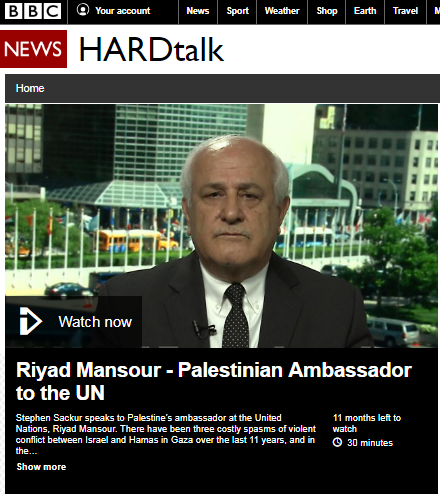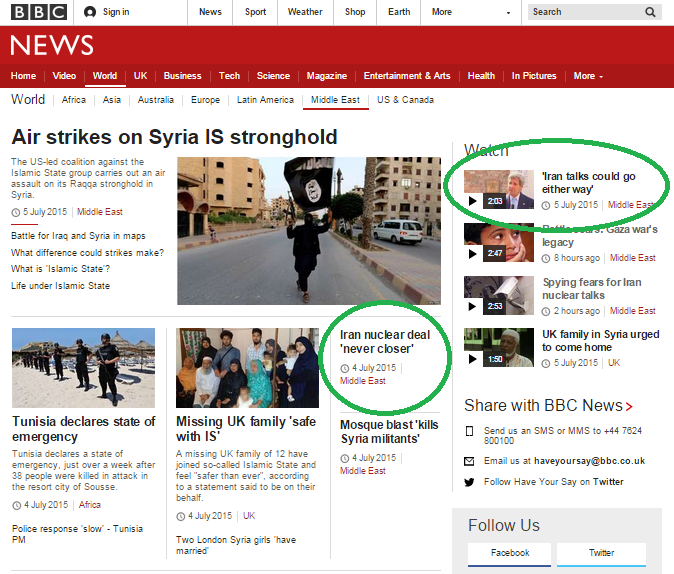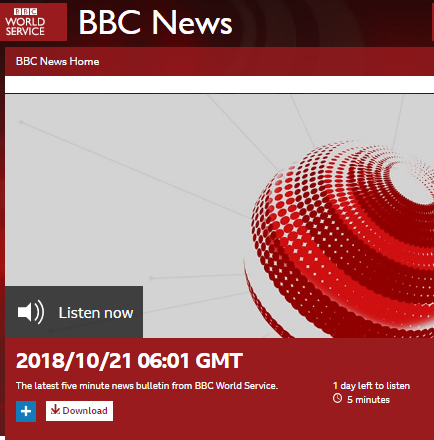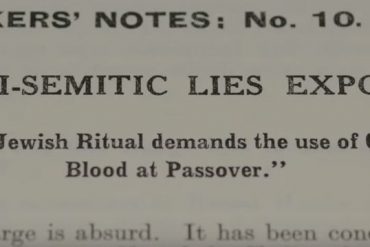As we saw in part one of this post, in the first part of the July 19th edition of ‘Hardtalk‘ (aired on the BBC News channel and the BBC World News channel and available to viewers in the UK on BBC iPlayer for the next eleven months) BBC audiences were exposed to a series of falsehoods, distortions and whitewashing of the ‘Great Return March’ violence that has been taking place throughout the past four and a half months.
After presenter Stephen Sackur had allowed his guest the PA envoy Riyad Mansour to get away with pretending not to have heard violent threats against Israelis from Hamas’ top man in the Gaza Strip, he changed the topic of the conversation.
Sackur: “You earlier referred to Gaza as a prison. You talked about the desperate conditions – humanitarian conditions – that people live in; pretty much 2 million people inside the Gaza Strip. In that circumstance, why is it that over recent months the Palestinian Authority has been imposing its own financial punishments and sanctions on the people of Gaza?”
Mansour retorted “I would not use, you know, these words that you are using” before going on to state that the Palestinian National Council had authorised the payment of salaries to employees of the Palestinian National Authority in Gaza.
Viewers were not told that those employees – who have not worked since 2007 – have repeatedly had their salaries cut and withheld by the Fatah dominated PA since April 2017. Instead, interrupting Mansour, Sackur went on:
Sackur: “Well forgive me Ambassador; maybe it’s slipped your mind but you know in recent months, after the failure it seems of the last reconciliation deal between Hamas and Fatah, what we’ve seen is Mahmoud Abbas – the president of the Palestinian Authority – impose different punishments on Gaza including holding shipments of medicine, cutting payments for Gaza’s electricity; all sorts of different ways in which the people of Gaza are suffering – not at the hands of Israel or even Egypt which closes its border crossing with Gaza – but at the hands of fellow Palestinians.”
As regular readers will be aware, BBC audiences have not been informed of the PA’s cuts of medical supplies and treatment referrals to Gaza Strip residents. Moreover, since that PA policy began, the BBC has continued to mislead audiences with regard to the background to the chronic crisis affecting healthcare in the Gaza Strip by leading them to believe that it is connected to Israel’s counter-terrorism measures.
Similarly, with the exception of one report on the BBC News website, audiences have been repeatedly led to mistakenly believe that the chronic electricity crisis in the Gaza Strip is also related to those same counter-terrorism measures. It is therefore highly unlikely that viewers of this programme would be able to recognise Mansour’s denial as the falsehood it is.
Mansour: “I don’t think that this is accurate but if you’re saying that there is much more that can be done to help our people in Gaza, that is true. And the Palestinian government – including President Mahmoud Abbas – is trying with many parties, including the Egyptians and the United Nations and other parties, to alleviate the situation, the difficult situation of our people in the Gaza Strip.”
Sackur then asked:
Sackur: “I mean you say you represent all Palestinians: have you seen the various protests and demonstrations by Palestinians against the policy of the Palestinian Authority inside Gaza? Have you also heard another senior Palestinian – I’m sure a man you know well; Mohamed Dahlan – who has called the PA government corrupt, fascist for punishing the Palestinians of Gaza. He says ‘I can understand the hardships facing the Palestinians. I cannot understand that the Palestinian leadership is imposing additional burdens on the people of Gaza’.”
Seeing as the internal Palestinian power struggles that are the background to Sackur’s chosen quote have been completely concealed from BBC audiences, it is highly unlikely that viewers would be able to put Mansour’s reply into its appropriate context.
Mansour: “Well I wouldn’t use quotation from the individual that you refer to. He used to be representing the Palestinian National Authority in the Gaza Strip. If he is referring to his conduct at that time then one can talk more of that. But he cannot speak with authority or respect about the behaviour of the Palestinian National Authority and the leadership of the Palestinian people, whether in the Gaza Strip or other parts of the occupied Palestinian territories.”
Sackur went on to pose two questions relating to Hamas-Fatah reconciliation and viewers heard Mansour state that the PA’s top priority is reuniting the “land of the State of Palestine”, even though no such state currently exists. Despite the BBC’s style guide recognising that fact – “There is no independent state of Palestine today” – viewers then heard Sackur use the same term.
Sackur: “There is another development which may or may not come to fruition in the next few weeks and that is the grand plan, the ultimate deal, the deal of the century that Donald Trump and his team say they’re going to put on the table to solve the Israel-Palestine conflict. Jared Kushner, his son-in-law is in charge of it. He said recently after a trip to the Middle East where he saw the Israelis, he saw the Saudis, he saw the Gulf leaders – he didn’t see any Palestinians ‘cos you appear to be absolutely unwilling to talk to the Trump team – Kushner said this: ‘the Palestinian leadership is scared that we will release our peace plan and the Palestinian people will actually like it’. Are you scared?”
Referring to Kushner, Mansour claimed “He is on one hand talking tough and on the other hand he is begging for us to engage with him” before going on:
Mansour: “For us if Jerusalem is off the table, refugees off the table and those who say that they are concerned about our people in the Gaza Strip they cut off $300 million from the budget of UNRWA, so how could you be helping the people in the Gaza Strip by depriving them of this large sum of money that helps 1.2 million Palestine refugees in the Gaza Strip? And also they say settlements now is not objectionable and they don’t refer much to the occupied Palestinian territories. What is left on the table to talk about?”
Sackur “Why are the Saudis, the Gulf State leadership, the Egyptians and the Jordanians all very happy to talk to the Americans and appear to be involved in trying to figure out how a peace plan might work? It seems you’re dangerously isolated.”
Mansour: “We are not isolated. They are engaging them for their own reasons including things related, you know, to the role of Iran in the region.”
Mansour went on to state that the PA wants to convening “an international conference” of “all relevant parties including the Americans, including the Europeans, the Russians, the Chinese, the Japanese and others” while claiming that the Americans “disqualified themselves from being honest broker”.
Sackur pointed out that there “won’t be a process without the Americans”, asking:
Sackur: “Are you Palestinians seriously saying that as long as Donald Trump’s in the White House you will not in any way whatsoever engage with the Americans?”
Mansour: “We will engage with them in collective process, through an international conference.”
Mansour then claimed that the UN Security Council had “legislated a decision to call for an international conference to be convened in Moscow”. Sackur did not clarify to viewers that he was apparently referring to the decade-old UN SC resolution 1850 which Abbas tried to resurrect in February of this year.
Sackur next raised the subject of opinion polls showing dissatisfaction with Palestinian leadership, stating “more than 60% of Palestinians…think Abbas should resign” and pointing out that he has “no obvious successor”.
Unchallenged by Sackur, viewers heard Mansour promote the fiction that the Palestinians have been ‘peacefully’ negotiating with Israel “for more than 20 years”.
Mansour: “One cannot blame the Palestinian people for their frustration. We tried the peaceful negotiation process for more than 20 years after the Oslo agreement and instead of putting an end to this occupation and enjoying independence, the reality on the ground moved from bad to worse, especially in the field of settlements. So one cannot but, you know, understand this frustration and the negative feeling among the Palestinian people.”
In response to Sackur’s statement that a generation of Palestinian leaders have failed, Mansour claimed “we assume our share of the responsibility” and went on to say that as a result the Palestinian National Council decided “to dissociate ourselves from the occupation and also not to continue on the path that did not lead us to the end of occupation, meaning the old style of negotiation.”
When Sackur again asked why Mahmoud Abbas has no obvious successor his guest replied:
Mansour: “I am confident that the Palestinian people will be able to elect the appropriate leader to lead us for the ongoing stage.”
Refraining from pointing out that the Palestinian people have not been able to elect their leaders for over twelve years, Sackur ended the interview there.
As we see, BBC audiences did not see any serious challenge from Stephen Sackur in response to Riyad Mansour’s lies about the ‘Great Return March’ and although Sackur twice insisted in the course of the interview that it was his job to ask ‘hard questions’, he continued to allow him to promote falsehoods on numerous other issues and to whitewash Palestinian violence.
It is of course difficult to see the point of an interview which includes questions relating to topics which the BBC has serially seriously under-reported (such as internal Palestinian power struggles and corruption) or inaccurately reported (such as medical supplies and electricity shortages in the Gaza Strip) – meaning that viewers do not have the basic knowledge necessary to understand the background to the question or form an opinion on the answer.
Related Articles:
Palestinian envoy’s falsehoods go unchallenged on BBC’s ‘Hardtalk’ – part one




